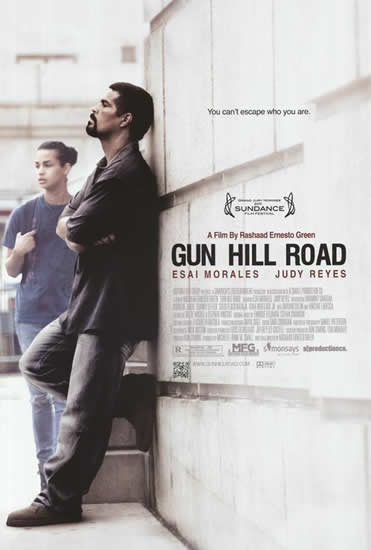 In Gun Hill Road , Enrique (Morales) returns home to the Bronx after three years in prison to find the world he once knew has changed. His wife, Angela (Judy Reyes, Scrubs, Oz), struggles to hide an emotional affair, and his teenage son, Michael (striking newcomer Harmony Santana, nominated for Best Supporting Actress at the Independent Spirit Awards), explores a sexual transformation well beyond Enrique’s understanding.
In Gun Hill Road , Enrique (Morales) returns home to the Bronx after three years in prison to find the world he once knew has changed. His wife, Angela (Judy Reyes, Scrubs, Oz), struggles to hide an emotional affair, and his teenage son, Michael (striking newcomer Harmony Santana, nominated for Best Supporting Actress at the Independent Spirit Awards), explores a sexual transformation well beyond Enrique’s understanding.
Unable to accept his child, Enrique clings to his masculine ideals while Angela attempts to hold the family together by protecting Michael. Still under the watchful eye of his parole officer (Isiah Whitlock Jr., HBO’s The Wire, Not Fade Away), Enrique must become the father he needs to be or, once again, risk losing his family and freedom.
Esai Morales, who has left indelible impressions playing both criminals (Bad Boys) and law enforcers (La Bamba, NYPD Blue, Fairly Legal), gives a powerful, career-defining performance as an ex-con struggling to do the right thing in GUN HILL ROAD.
Bijan Tehrani: How did you get involved playing in Gun Hill Road?
Esai Morales: I was approached during one of the dinners of the foundation that I co-founded with Jimmy Smits, Sonia Braga and Felix Sanchez called the National Hispanic Foundation for the Arts. We had a three-time recipient named Rashaad Ernesto Green who is half Latin, half African-American, from the Bronx, and he told me he had a script he was working on and wanted me to see when it was ready. Now many people tell me this and you politely say “oh ok, let me read it” but you don’t expect to see something ready to be made, because most of the time it’s not. A few months went by and I got a script from my agent, who said this young man sent this in, he says he talked to you, would you take a look? There’s not a lot of money in it, you can champion the film if you like it, you get producer credit but it’s a labor of love.
I finally read the script and I was blown away! This was unique! We’ve seen stories about a gay young man and the Latino father like in La Misión, but this one takes it a step further in that it’s a transgender child; he doesn’t even want to be a boy: the only son of a very macho man who comes out of prison in a place where homosexuality is not looked upon kindly, and all of a sudden he no 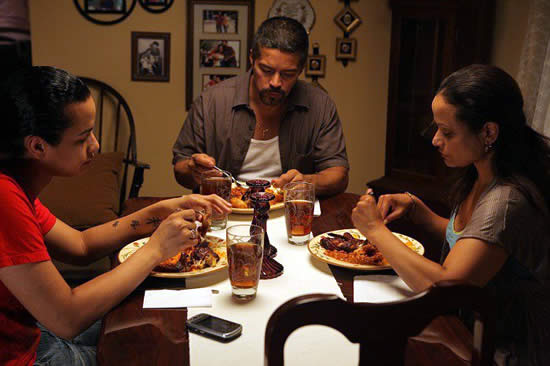 longer recognizes his little boy who doesn’t even want to be a boy anymore. I read the script and it brought tears to my eyes, and when that happens I pay attention because anything that can move me after reading so many scripts is movie-material. Movies don’t just move pictures and images but they move you emotionally. That’s what this film did to me and it helped me feel like I knew this character inside out. The young actor who plays my son, Harmony Santana, was also discovered during this project and everything came into place. I don’t know what one thing made it happen but I read the script, responded well, decided to join the cast which already included wonderful Judy Reyes, and the young man who became a young woman by the end of the movie… I was fascinated: usually in Hollywood you think everything, here there was no thinking, this was a real deal and someone who had never acted before ended up nominated for awards, so go figure! How I got involved… I don’t know, I’d call it destiny!
longer recognizes his little boy who doesn’t even want to be a boy anymore. I read the script and it brought tears to my eyes, and when that happens I pay attention because anything that can move me after reading so many scripts is movie-material. Movies don’t just move pictures and images but they move you emotionally. That’s what this film did to me and it helped me feel like I knew this character inside out. The young actor who plays my son, Harmony Santana, was also discovered during this project and everything came into place. I don’t know what one thing made it happen but I read the script, responded well, decided to join the cast which already included wonderful Judy Reyes, and the young man who became a young woman by the end of the movie… I was fascinated: usually in Hollywood you think everything, here there was no thinking, this was a real deal and someone who had never acted before ended up nominated for awards, so go figure! How I got involved… I don’t know, I’d call it destiny!
BT: One very interesting thing is the main situation that the main character is coming into: everything is against his beliefs or his values. How did you make a connection with the other characters playing your wife and your son?
EM: It wasn’t easy because we didn’t really know each other. There was a natural awkwardness that lent itself to the film. The young man didn’t know my work and Judy and I had never worked together so she didn’t know my work ethic. Sometimes, there may have been clashes of will and styles of preparation but we take these things and let them inform the story, enhance the piece. I remember trying to give acting coaching to young Harmony and I could tell after a few seconds she had had enough, but later on during the shoot she came to me and said, oh wow I didn’t realize you did all these films, she came back with a renewed sense of respect for me. But at first she didn’t care to hear what I had to say.
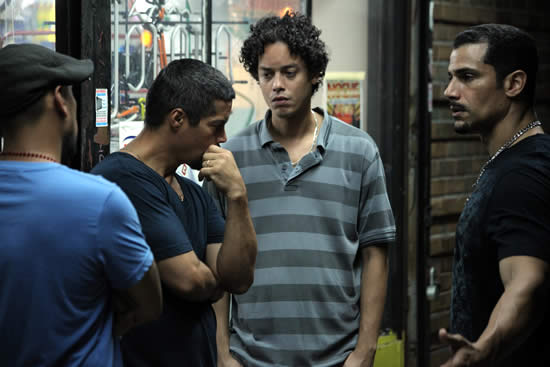 BT: You started out in theater and you also have some experience directing yourself. How much does your experience in theater and in directing help you when you are acting in a film?
BT: You started out in theater and you also have some experience directing yourself. How much does your experience in theater and in directing help you when you are acting in a film?
EM: It’s very helpful because I realize that as an actor my instinct is to push, to give and feel extra sincerely, and as a director my instinct is to layer, to not overstate, to let the film tell the story and not push any one element to tell the whole story. I remember our director wanted to tell the story in every scene and I told him, you don’t have to tell the whole background of the film in every single scene. You need to let the audience discover some things for themselves, otherwise they are bored. You have to keep a degree of intrigue and mystery. That’s something young directors don’t always understand. I think some of the best stories are the ones that sneak up on you and carry your heart out, but it can only work when you don’t see it coming.
BT: Exactly! I think Gun Hill Road is also a story of today. I think a lot of people are dealing with that but may not want to accept it.
EM: Absolutely! We are dealing with gay marriage, transgender being beaten in a McDonalds somewhere, we’re dealing with a lot of hate crimes and bullying, and this film is a very powerful message against bullying. You don’t have to be transgender, gay, black or Latin to identify with this film. That’s what I was most impressed with during Sundance. We’ve had older white ladies coming to us saying they loved the movie! And that’s success: when you have people who are not from your background who appreciate your efforts and tell you how it moved them and enlightened them.
BT: You’ve played many different parts, villains, good guys, but in every part you have played, there are so many different layers. There are always gray areas in your characters: how do you manage to do that?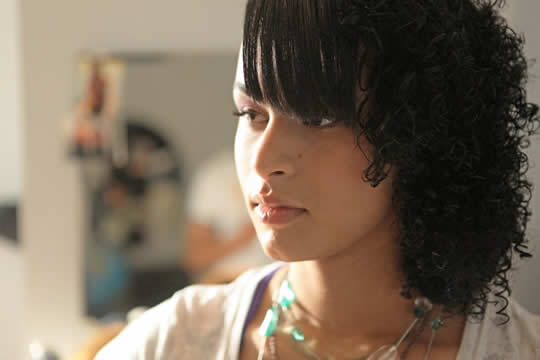
EM: I think the gray areas are where the humanity exists. I don’t think people are good or bad; they just are. Their actions can have good or bad consequences, and that’s very different. I think America in general has been raised on this notion of good vs. evil when in fact good people do bad things all the time and bad people do heroic things too. I like to live in that gray area because it’s the only place where you can glow. I think we’ve been brainwashed into believing that revenge is an ends to a mean, as in the good guy avenges everyone. I believe the best revenge is to live a good life. I like the gray areas because people are not so sure anymore – is he a good guy or a bad guy? and people lose their black and white perspective. We live in a world where it’s not so simple.
I think it’s a form of mind-numbing conditioning to make people choose – you’re either with me or you’re against me. Just like our past president: you’re either with us or you’re with the terrorists. I think we can be the terrorists if we don’t watch it… It’s part of a bigger narrative where we Americans always feel like we are the good guys. When have we ever examined our behavior on a collective national level? Movies can help enlighten and enhance your perspective on life; unfortunately if they’re not done well, they just narrow and limit your ability to grow. When are we going to take responsibility for our behavior when we expect everyone else to? These are things I’m not really welcome to talk about because they’ll call me an America hater. I love America but I just wish it was more honest.
There are no bad guys or good guys in this movie: they are all hurt people, and that’s the truth in the world.
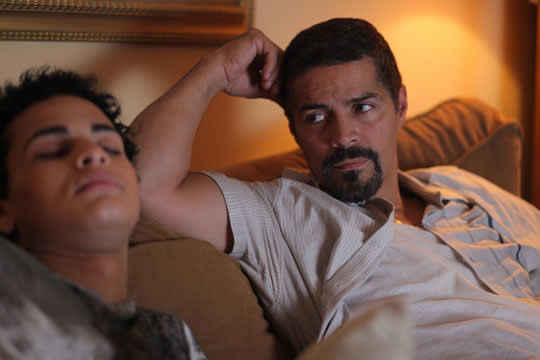 BT: You are also an activist, you have founded the National Hispanic Foundation for the Arts. Tell us a little bit about your activism.
BT: You are also an activist, you have founded the National Hispanic Foundation for the Arts. Tell us a little bit about your activism.
EM: I noticed there were a lot of things you could do to help the human condition. Instead of sitting by the phone being self-obsessed, what I found out, even when I was very depressed, is the most value I could get from myself was to help others. I found out I was more valuable to myself and others if I lent my talents and ability to communicate to others with a good cause. I try to be as selfless as I can be. When I leave this world, I want to leave a trail of people who were grateful I entered their lives, not just someone to admire but someone who could share. We’re all going to die someday so why not live in a way that’s generous? Why not create walls of good will around yourself? That seems to protect me more than anything else. All the good things that I do in my life make up for all the stupid things I have done, and believe me: I have done more than I care to ever share! Kindness is the reward in itself: it feels good and human to be kind. I’m a student of the human condition, and if you study the human condition, there’s nothing that makes you feel more human than to help out a fellow human being.
As an actor, you get much much more rejection than you get acceptance and it takes a certain personality to withstand that, in certain cases a little bit of craziness and in other cases an understanding that not everybody can get every job – you can’t take it personally. I find Hollywood too obsessed with what you’re wearing and who you’re doing. The Oscars became a fashion show: that’s disgusting to me! I don’t mind fashion but when did the Oscars become more about what people wear than their work? It shifted somewhere in the 80s or 90s. It makes me feel sad that people are more obsessed with the superficial instead of the condition of their fellow human beings.
BT: Absolutely true. What are some future projects you are working on?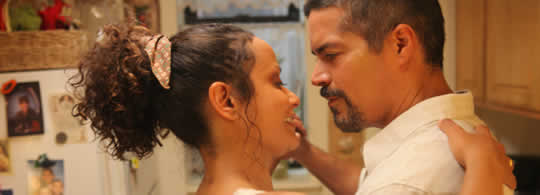 EM: Right now, I am doing some television work. I just finished a show called Magic City, which is like a movie. It’s an amazing show that takes place in the late 50s, early 60s in Miami and La Havana: I play a Cuban general. I’m about to start a wonderful role on a pilot called The Advocates. The feature film I did most recently was Atlas Shrugged II, where I went across the political lines and played a character that’s a hero to many right-wing Ayn Rand fans who don’t believe in charity, or at least don’t believe in welfare… I am not left or right: I am a combination because I realize that as a bleeding heart liberal you have to stop the bleeding at one point or else you’re going to die! You have to take care of yourself first so that then you can take care of others, just like when you’re on a plane if the gas mask comes down. I’m more valuable as someone who is successful, someone who took care of the core, the center: my own existence. Some people wrote on my Facebook: how can you play that character? It’s simple: I find the parts in me it resonates with. And you know what, I don’t believe I should work hard and let the State take it and give it to people who don’t work at all: that’s not charity! Charity is for people who through no fault of their own are in a bad place but if you’re a young man, healthy and able to work, I won’t give you money just because you hold a sign up! I don’t believe you have to be left or right: I believe you have to be right or wrong! The minute you choose one side, you do so at the expense of your other half. My heart belongs to the human race and the human condition and it has a bit of everyone in it. I don’t judge people until their behavior forces me to. I’m an individualist who believes in the collective good but without going to either extreme.
EM: Right now, I am doing some television work. I just finished a show called Magic City, which is like a movie. It’s an amazing show that takes place in the late 50s, early 60s in Miami and La Havana: I play a Cuban general. I’m about to start a wonderful role on a pilot called The Advocates. The feature film I did most recently was Atlas Shrugged II, where I went across the political lines and played a character that’s a hero to many right-wing Ayn Rand fans who don’t believe in charity, or at least don’t believe in welfare… I am not left or right: I am a combination because I realize that as a bleeding heart liberal you have to stop the bleeding at one point or else you’re going to die! You have to take care of yourself first so that then you can take care of others, just like when you’re on a plane if the gas mask comes down. I’m more valuable as someone who is successful, someone who took care of the core, the center: my own existence. Some people wrote on my Facebook: how can you play that character? It’s simple: I find the parts in me it resonates with. And you know what, I don’t believe I should work hard and let the State take it and give it to people who don’t work at all: that’s not charity! Charity is for people who through no fault of their own are in a bad place but if you’re a young man, healthy and able to work, I won’t give you money just because you hold a sign up! I don’t believe you have to be left or right: I believe you have to be right or wrong! The minute you choose one side, you do so at the expense of your other half. My heart belongs to the human race and the human condition and it has a bit of everyone in it. I don’t judge people until their behavior forces me to. I’m an individualist who believes in the collective good but without going to either extreme.
BT: Very well said. Thank you!
Gun Hill Road has arrived on DVD on March 5, 2013, from Virgil Films, carrying an SRP of $19.99. The film will also be available on Digital Download.

